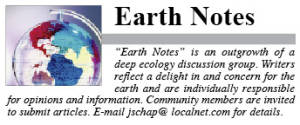Earth Notes: No ‘backup’
 By Rev. Robert Plaisted         Â
By Rev. Robert Plaisted         Â
It’s a pleasure to make my first contribution to the “Earth Notes†column, which provides serious, thought-provoking ideas on the relationship between human beings and the natural world in which we live.
We have no spare Earths lying around to provide sustenance for our existence, should the day come that our home planet can’t do so. That simple fact should be enough to motivate us to care for the earth as lovingly as we care for our own offspring, but that clearly has not been the case thus far.
People who play chess will be familiar with the term “end game.†It refers to the final set of moves in a chess match, when a minimal number of pieces remain on the board and the outcome depends largely on the relative skills of the players. The greatest chess masters play brilliant end games, lesser players, not so much.
Those who take climate science seriously understand that we’re now in the end game of a long chess match between human civilization and nature, so how skillfully we play during the next few decades will determine how the game turns out. The first thing to realize is that nature cannot be defeated. The best outcome we can achieve when we compete against nature is a draw, in which nature leaves us alive and able to play again tomorrow. For most of human history, we have falsely assumed that we can strong-arm nature and bend it to our will. We can’t. At this point, let’s hope is that nature won’t shrug us aside as casually as an elephant brushes an annoying parasite off its back. In this game, nature always gets the last move.
We’ve been making the same mistake at least since Old Testament times, misinterpreting the biblical creation story in which God tells human beings to “be fruitful, and multiply, and replenish the earth…â€(Genesis 1:28). During the last century we’ve been great at multiplying, but perfectly awful at replenishing the earth. Since the Industrial Revolution, we’ve regarded the earth as a giant piggy bank of resources that we are entitled to plunder and exploit until every last acre of land, gasp of air and quart of water has been used up or polluted beyond any human usefulness. Therein lies the great internal fallacy of capitalism. It demands perpetual growth within a system of finite resources — a scientific impossibility, which we’re only now beginning to confront.
Pope Francis recently preached on the creation story, saying, “A Christian who does not protect creation…is a Christian who does not care about God’s labors…we are the lords of creation, not its masters.†There’s no arguing with that theology, although “Christian conservatives†probably will do their best to pussyfoot around this papal teaching while accusing the Pope of meddling in politics, or some such nonsense.
Religious Rightists detest it when high spiritual authorities teach that Christian morality applies to other subjects besides sexual behavior, such as economics and climate science. So they’d better fasten their seatbelts in the coming months, because their stuffy, moralizing version of Christianity is in for a bumpy ride. This Pope’s undergraduate degree was in chemistry. He understands science and the existential threat that anti-scientific attitudes pose to human civilization and to the human species itself. He has announced that a papal encyclical on protecting God’s creation will be forthcoming in the near future. He clearly intends to do all in his power to make such head-in-the-sand, climate science denialism an unpleasant place for Christians to dwell in the coming years. More power to him.


